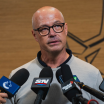Canucks’ Chief amateur scout, Ron Delorme broke barriers for Indigenous athletes since he stepped foot in the NHL nearly 50 years ago.
Giving others the opportunity to learn the game of hockey that might not otherwise have had the chance is something he’s proud of and sharing his culture with hockey fans is special.
“There’s progress being made in diversity. It’s great to see the different nights in the NHL, they’re committed and that means a lot to me,” he said.
A celebration of Indigenous history, this night is an important and special one for Delorme. He thinks about those closest to him and looks at how much progress has been made across the league since he was a player.
“To me, this night is to honour those who can’t be here, like my mother who was a survivor of the residential schools,” Delorme said. “It’s also a day for me to remember to pay homage to whom I call my brother, the legend Gino Odjick.”
“The benefit of being around the game a long time, 46 years, is seeing things change all across Canada. It’s change for the better. I’ve witnessed progress in inclusion, diversity, celebrations of different nights, including First Nations Night.”
Having the opportunity to honour his mother and residential school survivors when announcing Danila Kilmovich, as the Canucks’ second-round pick in the 2021 NHL Draft is one moment of many where he’s had a front-row seat to change.
Playing hockey on a frozen lake in Cochin, Saskatchewan, his hockey role models growing up were Fred Sasakamoose, the first Indigenous Canadian to play in the NHL, and Jim Neilson. He recalls Sunday hockey games in Cochin against city kids of North Battleford, and one particular Sunday a scout showed up – Chief George Armstrong – who invited Delorme and his friends to come to the city and play organized hockey. They all agreed, even though they didn’t have cars to get there, but they figured out ways to make it work. All Delorme’s friends stopped playing, but he figured if Armstrong saw something in him then he was determined to see how far his talents would take him.
“I continued to go and play and that’s how it all started. My Dad didn’t have a vehicle, but he’d always find a way to get me there,” Delorme said.
The rest is history.
Delorme played for the Canucks from 1981-85, when a knee injury ended his career. The 1981-82 season was his most memorable year in the NHL with the Stanley Cup run and the beginning of Towel Power. Delorme explains the team was “like a family”, adding one of the greatest things he received during his four years in Vancouver was life-long friendships.
There were many lessons Delorme learned through being part of the Vancouver franchise that he lives by to this day.
During the ‘82 Campbell Conference Championship against the Chicago Blackhawks, Canucks’ coach Roger Neilson made the tough fourth-line winger feel valued as if he was the star on the team.
“At the time I was playing between the third and fourth lines and my job was to take care of Thomas [Gradin]. I had jammed my foot along the boards, and it hurt so bad I could hardly skate,” Delorme said. “I come off the ice and go to a medical table in the back and Thomas was on medical table across from me. Roger came over and explained to me my value to the team. He said, ‘Listen. Work your way to the bench when you can, we’ve got to let the other team think you’re ok.’ I looked at him and said ‘Roger, I could fly out of here!’ that’s how important he made everyone feel.”
Pat Quinn instilled in him the importance of giving back and lending time to others. Delorme’s been able to share his culture with others, and in turn bring hockey to First Nations people through hockey schools and camps. Before he passed away, Odjick was part of the group helping Delorme with hockey camps; the group includes numerous former NHLers, including Arron Asham, Jordin Tootoo, and Sheldon Souray. Delorme is also a mentor to Indigenous youth, encouraging them to follow their dreams like he did.
“The game’s been great to me, but it’s what I’ve been able to give back that makes me so happy,” he said, noting that involvement in sport serves us for a lifetime. “It helps you stay strong and healthy; tests your physical ability and I think it also teaches you to work as a team.”
Delorme won the Jake Milford Award in 2021 for his contributions to hockey throughout the province of B.C. He’s proud of what he’s been able to accomplish and sees the success in players he’s helped, like Odjick, also take the responsibility of growing the game within their communities.
“When I think about Gino and his contributions to the sport of hockey, I feel so proud of him for what he was able to do for the sport and how I was able to help him,” Delorme said, sharing, “Gino would always give back, whether that was stopping to sign autographs or otherwise, and he lived that right until the end.”
Delorme’s attitude and cultural values have been the driving force of why he advocates for Indigenous youth, hoping the game he loves so much can reach more people.
He's talks about wanting to slow down as the 68-year-old is “only” scouting Canada West these days, which spans from Manitoba to B.C. and down the West Coast to Portland.
He’s has used his platform to advocate for First Nations youth and has been instrumental in providing opportunities for others to experience the joys of the game like he has.



















